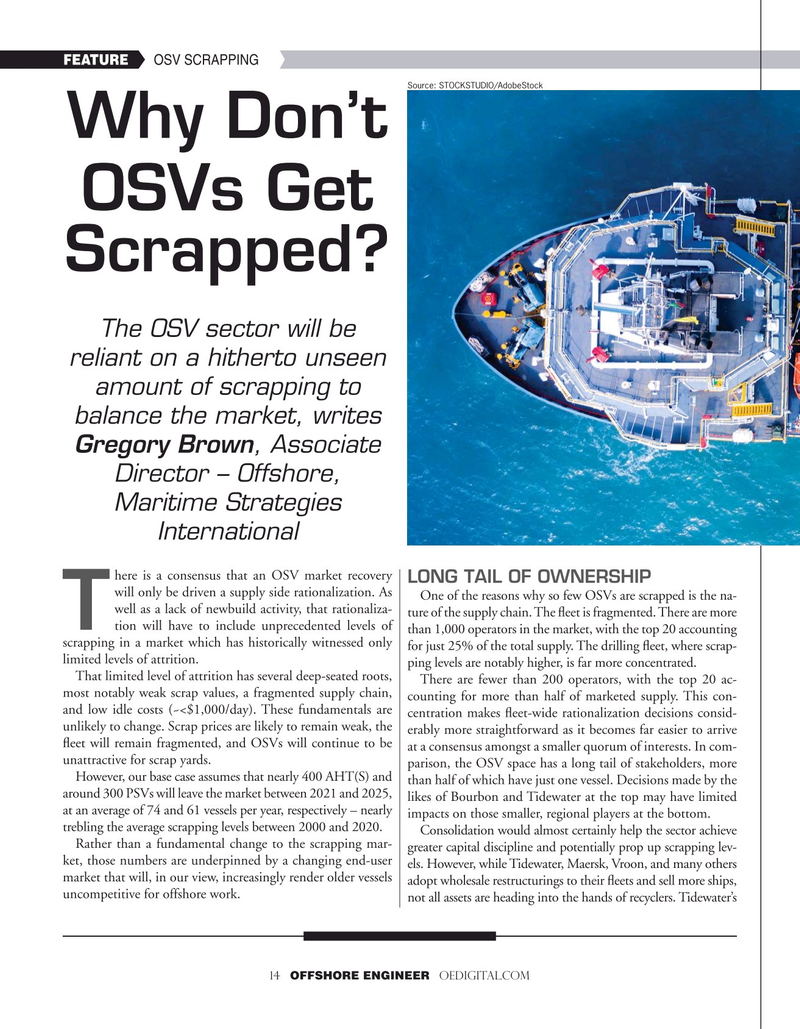
Page 14: of Offshore Engineer Magazine (Jan/Feb 2021)
Floating Production Outlook
Read this page in Pdf, Flash or Html5 edition of Jan/Feb 2021 Offshore Engineer Magazine
FEATURE OSV SCRAPPING
Source: STOCKSTUDIO/AdobeStock
Why Don’t
OSVs Get
Scrapped?
The OSV sector will be reliant on a hitherto unseen amount of scrapping to balance the market, writes
Gregory Brown, Associate
Director – Offshore,
Maritime Strategies
International here is a consensus that an OSV market recovery
LONG TAIL OF OWNERSHIP will only be driven a supply side rationalization. As
One of the reasons why so few OSVs are scrapped is the na- well as a lack of newbuild activity, that rationaliza- ture of the supply chain. The ?eet is fragmented. There are more
T tion will have to include unprecedented levels of than 1,000 operators in the market, with the top 20 accounting scrapping in a market which has historically witnessed only for just 25% of the total supply. The drilling ?eet, where scrap- limited levels of attrition.
ping levels are notably higher, is far more concentrated.
That limited level of attrition has several deep-seated roots,
There are fewer than 200 operators, with the top 20 ac- most notably weak scrap values, a fragmented supply chain, counting for more than half of marketed supply. This con- and low idle costs (~<$1,000/day). These fundamentals are centration makes ?eet-wide rationalization decisions consid- unlikely to change. Scrap prices are likely to remain weak, the erably more straightforward as it becomes far easier to arrive ?eet will remain fragmented, and OSVs will continue to be at a consensus amongst a smaller quorum of interests. In com- unattractive for scrap yards. parison, the OSV space has a long tail of stakeholders, more
However, our base case assumes that nearly 400 AHT(S) and than half of which have just one vessel. Decisions made by the around 300 PSVs will leave the market between 2021 and 2025, likes of Bourbon and Tidewater at the top may have limited at an average of 74 and 61 vessels per year, respectively – nearly impacts on those smaller, regional players at the bottom. trebling the average scrapping levels between 2000 and 2020.
Consolidation would almost certainly help the sector achieve
Rather than a fundamental change to the scrapping mar- greater capital discipline and potentially prop up scrapping lev- ket, those numbers are underpinned by a changing end-user els. However, while Tidewater, Maersk, Vroon, and many others market that will, in our view, increasingly render older vessels adopt wholesale restructurings to their ?eets and sell more ships, uncompetitive for offshore work.
not all assets are heading into the hands of recyclers. Tidewater’s 14 OFFSHORE ENGINEER OEDIGITAL.COM

 13
13

 15
15